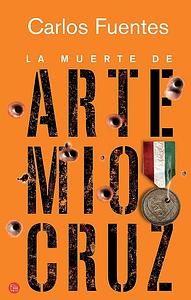Take a photo of a barcode or cover
challenging
dark
emotional
reflective
sad
tense
medium-paced
Fuentes aims high with this book, seeking to capture within the process of dying, not only reflection on one's life, but also reflection on Mexico's revolution and transformation from the late 19th to 20th century. Through varied writing styles, Fuentes manages to make you intimately familiar with Artemio Cruz's stages of life and death, full of idealism and skepticism which reflect those of the revolution as well. Despite being an unreliable, thoroughly detestable character, Artemio Cruz becomes more sympathetic as glimpses of his past paint a more complex man. While sections of this book were rather dense, full of ramblings of a dying man or the hopes of a young man, this book also moved me and overall felt like an accomplishment.
adventurous
dark
emotional
reflective
medium-paced
Plot or Character Driven:
Character
Strong character development:
Yes
Loveable characters:
Complicated
Diverse cast of characters:
Yes
Flaws of characters a main focus:
Yes
Fuentes muestra su maestría en el manejo temporal y desarrollo de personajes.
Una obra atemporal que sigue la vida la vida de Artemio Cruz mientras él pasa las últimas horas de su vida recordando/olvidando lo que fue, es y será. Situada en la Revolución Mexicana, Fuentes nos lleva a un pasado obscuro e intrigante de nuestra historia, aunque de ficción se trate.
Una obra atemporal que sigue la vida la vida de Artemio Cruz mientras él pasa las últimas horas de su vida recordando/olvidando lo que fue, es y será. Situada en la Revolución Mexicana, Fuentes nos lleva a un pasado obscuro e intrigante de nuestra historia, aunque de ficción se trate.
This is the first Fuentes I’ve read, and I really loved it by the end. Mexican literature has been sort of a blind spot for me that I’ve been trying to fill, and this one is a standout. There is definitely a shared lineage among Latin American writers from the middle of the century onward, and you feel that here. I’ve really enjoyed what I’ve read of Garcia Marquez, Cortàzar, Bolaño, etc., and Fuentes will sit comfortably on the shelf alongside those.
The Death of Artemio Cruz is intimidating, and Fuentes demands a lot of you as a reader: it is a thoroughly post-modern novel that’s really embedded in Mexican history (and beyond). The day I spent down a Wikipedia rabbit hole on the Mexican revolution really paid off in terms of following major parts of this story. You’ve also got to read on despite not understanding some things; confusion—ours and his Cruz’—is a narrative device Fuentes uses heavily. The images and words that return to Cruz again and again in his hospital bed literally express his own attempt to orient himself, to remember himself, while his body fails him. They also propel the plot for the reader. We are placed again and in the middle of a stream of sensations and thoughts, and incrementally we are fed the context we need to orient and situate ourselves in the narrative. This functions at both the micro level (in passages a few pages long) and the macro (the overall plot) and is extremely effective. Once you get accustomed to the structure, you can trust that the confusion is part of the journey and things will be clarified (though not explicitly spelled out) in the end. This works because Fuentes’ prose is beautifully written, and the stream of consciousness has a poetic quality that we can enjoy even before we understand.
This begins as a Great Man novel, and for some time it’s unclear to what extent it will stick to this archetype. By midway through, it’s entirely clear that this novel is something more radical, a postmodern novel that undermines the Great Man theory. There’s a misogyny early in that I thought might be a sticking point. I certainly underlined some cringeworthy “men describing women” passages. But by the end, there are some sequences that make clear that the misogyny belongs to Cruz the narrator and not Fuentes the author.
In the end there is a really satisfying emotional, narrative, and literary payoff.
Le reconozco el mérito, la fantasía de las voces, el juego de ir abriendo la cortina poco a poco y dosificar la información al detalle para que el lector solo sepa lo que el autor quiere y cuando quiere pero lo siento mucho, es una piedra. Las casi cuatrocientas páginas más largas y más densas que he leído en mi vida. Este juego, que resulta que es su gran logro literario, para mí ha sido un lastre desde la primera página. El tal Artemio, además, es un bicho de muchísimo cuidado con el que me ha sido imposible empatizar salvo en el tramo final que, desgraciadamente, llegó tarde para compensar el resto.
dark
emotional
reflective
slow-paced
Plot or Character Driven:
Character
Strong character development:
Complicated
Loveable characters:
No
Diverse cast of characters:
Complicated
Flaws of characters a main focus:
Yes
There is something to appreciate about the style of the narrative, I definitely like that part, the scatteredness of the thoughts and the memories, and I absolutely loved the moments in which the author delved into some sort of body horror with the descriptions of how it feels to be dying from the main characters perspective
The good part being said, I just couldn't get into it myself, there was nothing that made me get into following the main character or the vague snippets of the story happening in the background, so yeah, it was good, just not for me
The good part being said, I just couldn't get into it myself, there was nothing that made me get into following the main character or the vague snippets of the story happening in the background, so yeah, it was good, just not for me
dark
emotional
reflective
slow-paced
Plot or Character Driven:
Character
Strong character development:
Complicated
Loveable characters:
Complicated
Diverse cast of characters:
No
Flaws of characters a main focus:
Yes
This narrative follows an idealistic revolutionary soldier who participated in the Mexican Revolution, only to find himself transformed into a powerful politician marked by corruption and solitude. He navigates a life filled with personal estrangement, with a wife who lacks affection for him and a disconnect from his children. The story delves into themes such as betrayal, the destructive nature of ambition, the costs of power, regret, and mortality, among others. I genuinely believe it is an exceptional book, and I fully understand why it has such a high status as a classic in Latin American literature. The only reason it doesn’t receive a higher rating is that, despite its beauty and greatness, it doesn’t entirely resonate with my personal preferences. I can appreciate art even if it doesn’t align with my tastes, and this piece exemplifies that distinction, as it undoubtedly represents true artistry.
Um. I'm not sure. Four stars for the sheer power of the writing. But I was very up and down with it as I read.
slow-paced
While I could say this for many books, I am more afraid in this than most – of may be missing the whole point. In any case, I think the author deals with 3 parallel themes: self, family and society. All are dealt in a particular context of the revolution and wars in Mexico. But, while each theme is treated in its own way, the cyclical nature and hence the futility of each – whether a highly accomplished life or a revolution, come across in each. There are many streaks of enjoyable prose and of varying kind, but the author’s effort at many places to evoke a feeling or an emotion by long streams of thought or narration wears on you. While he could have been stingy with the words, I wonder if any alternate technique would have made it easy on the reader. Artemio, the main character, defends how he lived and he seems to regret how his family life turned out. The irony is that I realized that while I could not agree with his argument, I could still not accuse him based on the broader context of the times, though he does not seem to use that to argue. So, do we judge ourselves differently than others? Does a person’s choices and interests have a less of an effect than he thinks, whether good or bad? A related point that crops in many places is the role of chance, small mistakes and side effects that occur every day and shapes the future more distinctly than given merit for. The author employs interesting ways that alter the time and space of the narrative, especially the observations of the dying body and narration that jumps time.




